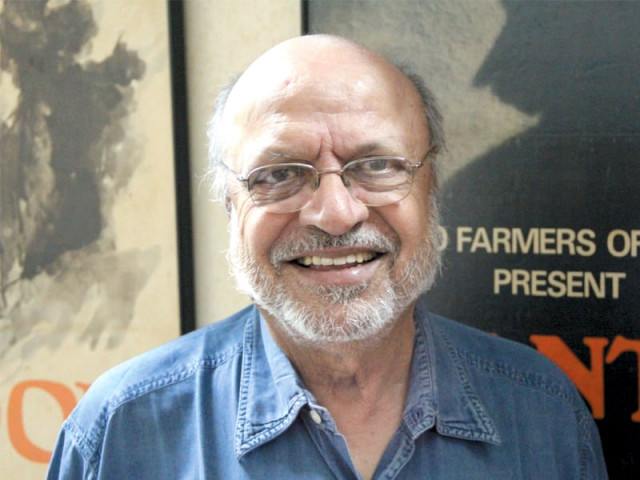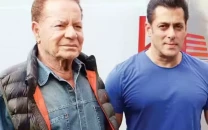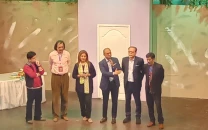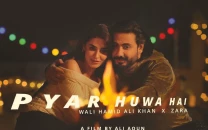Shyam Benegal talks film and a pre-partition project
The Indian director says the story will be based on meetings that took place in assemblies in 1946.

Although he is one of India’s most distinguished parallel cinema directors, there is nothing alternative about Shyam Benegal; no long hair or quirky habit — nothing out of the ordinary.
Benegal is a legendary and prolific screenwriter and director. During the late ‘70s and ‘80s, he changed the parameters of Indian cinema with his groundbreaking work which seemed to focus on the common man. Recently, he was in Lahore for a four-day film festival which was held by the Faiz Foundation Trust.
“Films are cultural products,” Benegal tells The Express Tribune, while seated at the house of Faiz Ahmed Faiz’s daughter, Moneeza Hashmi. “They are a product of your own culture, so it’s always interesting to get reactions from different kinds of audiences and cultures,” he says, commenting on his participation in the festival.
Today, the almost 77-year-old has developed immense wisdom about film as an art. He remains active and is currently working on a 10-hour long story on the making of the Indian Constitution. Two of his feature film projects have been delayed for this project. “It is important for our people to recognise the principles and laws that we live by, and what defines us as a nation. It is all crystallised into the constitution,” says Benegal.
He touched upon the partition of India, saying: “It has been 65 years. I think that it is time to look at what guides our lives, socially, economically and politically — the process through which we want to conduct our lives and more importantly, answer questions whether this democracy that we have created on the basis of the constitution has worked effectively or not.”
Benegal says that the story will be based on the meetings that took place in constituent assemblies in 1946. He has chosen several actors who will play the role of people and leaders of that time.
“The kind of films I make do not necessarily warrant a bigger budget, because then I would have to earn more money,” he says. “You have to make a film based on the needs of the audience,” says Benegal.
His major break after his first feature film Ankur in 1974, also showcased the birth of a clique of actors such as Naseeruddin Shah and Shabana Azmi. Benegal remains modest about introducing such fine actors to the industry.
“Naseer is a brilliant actor,” says Benegal. “Even if he hadn’t started his career in my films, he would have been known as a brilliant actor. The same goes for the others — I am fortunate they chose to start through my films. They were always very talented and would have made a name [anyway].”
Benegal explains that mainstream film-making has now broadened to accommodate different genres. “Today, you don’t talk about alternative or parallel cinema. It’s all part of the same cinema; some are good films and some are not so good films; some have purely commercial intent others have greater artistic intent,” says Benegal.
“The advancement post-privatisation has been that technology has grown by leaps and bounds, and now can freely come into the country. The techniques and the ability to make films have become much more professional and technically perfect.”
Similarly in Pakistan, this debate seems ripe as old film-makers try to match upto changing dynamics but on a different level. Collaborating with India, is a new thing, Benegal recounts.
“It’s normal. We have a relationship that goes back centuries and we are culturally very alike,” says Benegal. “Unfortunately, it’s not possible to have much collaboration at the present moment until we have the relevant trade agreements.”
Published in The Express Tribune, October 18th, 2012.
Like Life & Style on Facebook and follow at @ETLifeandStyle for the latest in fashion, gossip, entertainment



















COMMENTS
Comments are moderated and generally will be posted if they are on-topic and not abusive.
For more information, please see our Comments FAQ